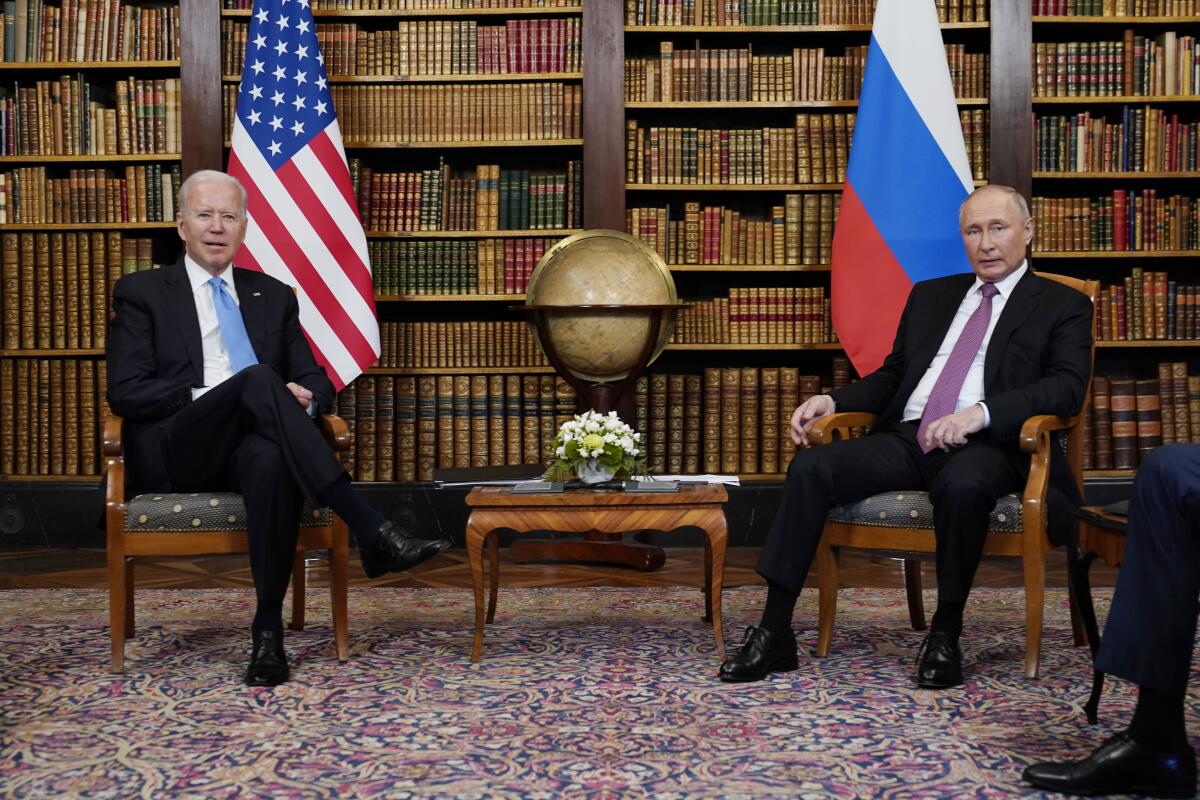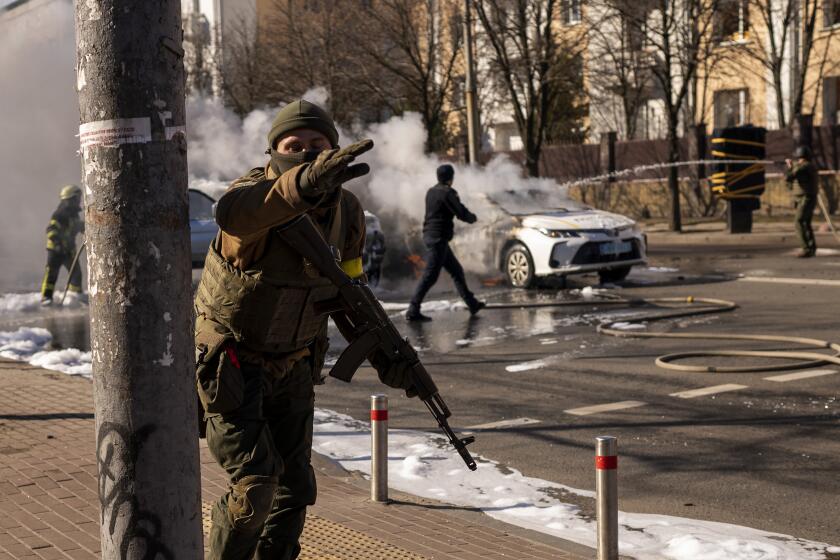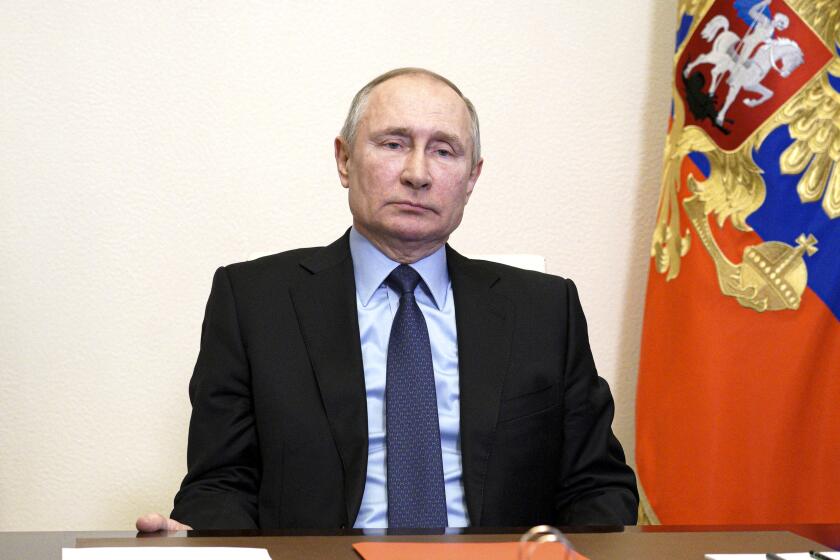Will Putin’s Ukraine invasion become a nuclear confrontation?

- Share via
Who remembers what it was like to live under the constant threat of nuclear annihilation?
For half a century, Moscow and Washington glared and growled at each other, eyeball-to-eyeball. Each sat on an enormous arsenal of world-destroying weapons. War was always a hair-trigger away, hanging on a single miscalculation, a hotheaded leader, a press of a few buttons.
Armageddon could have been touched off in Cuba or the Middle East or Angola or Afghanistan, but the most likely nightmare scenario was usually a war in Europe — like the two devastating ones that dominated the first half of 20th century — that would get out of hand and lead to mass destruction.
Opinion Columnist
Nicholas Goldberg
Nicholas Goldberg served 11 years as editor of the editorial page and is a former editor of the Op-Ed page and Sunday Opinion section.
Miraculously, the superpowers managed to avoid that unimaginable outcome. Eventually, the tensions abated. Until now.
Suddenly the United States and Russia — still the world’s two heaviest-armed nuclear powers — are facing off in an epic, escalating conflict over Ukraine.
And the nuclear threats have already begun from the Russian side.
“The consequences will be such as you have never seen in your entire history,” Russian President Vladimir Putin said Thursday about outsiders who dared interfere with his plans for Ukraine.
Not explicit enough? He also said: “Russia remains one of the most powerful nuclear states. Moreover, it has a certain advantage in several cutting-edge weapons. In this context, there should be no doubt for anyone that any potential aggressor will face defeat and ominous consequences should it directly attack our country.”
Then on Sunday, he put his country’s nuclear deterrent forces on “high alert” in response to what he called “aggressive statements” from the West against Russia. No one seems sure exactly what “high alert” entails, but it doesn’t sound good.
Russian troops bear down on Kyiv and continue their thrust into Ukraine’s second-largest city, Kharkiv. Putin puts nuclear forces on alert.
Whatever Putin’s intentions — and maybe this is all a lot of bluster — these are dangerous, irresponsible nuclear threats more specific and more aggressive than any uttered by a world leader in decades. And Putin is not just any world leader. His country has more nuclear warheads in its stockpile than any other in the world, including the United States.
According to the Federation of American Scientists, Russia possesses nearly 6,000 nuclear warheads. The United States has just under 5,500.
At least we’re not in a situation comparable to the close-call 1962 Cuban Missile Crisis, when President Kennedy believed the chance of nuclear war was “between one-in-three and even.” Most experts seem to believe our risk of nuclear war remains small, thanks in great part to the Biden administration’s decision that it will not directly intervene militarily in Ukraine.
Stephen Walt, a professor of international relations at Harvard’s Kennedy School of Government, told the New York Times last week, “My chances of dying in a nuclear war still feel infinitesimally small, even if greater than yesterday.”
I asked Walt to elaborate. “I do not believe Putin or his associates are suicidal, and it does not take a genius to figure out what a nuclear exchange would do to both sides,” he told me Sunday. “For this reason, I do not expect nuclear weapons to be used. But accidents can happen, and leaders sometimes miscalculate badly.”
Hans Kristensen, the director of the Nuclear Information Project of the Federation of American Scientists, told me he too wasn’t terribly worried that nuclear weapons would be used in the conflict “as it is unfolding now.”
“But if it continues to escalate and NATO and Russian force operations somehow become entangled,” he added, “then there is a real potential for further escalation and overreactions.”
I’ll defer to the experts. But just to be clear: Though the chances are small that we’ll inadvertently stumble into a nuclear confrontation, it cannot be ruled out. Wars are easier to start than to stop, and easier to escalate than to limit.
Putin initially said he was only interested in protecting the breakaway regions in eastern Ukraine, but that was a lie. And once he’s set his sights on the whole of Ukraine, well, why stop there? If he’s so eager to undo the supposedly humiliating dismemberment of the Soviet Union, why not invade and occupy more of his neighbors? Especially if he believes the West is too irresolute to stop him.
The U.S., for its part, has said it won’t become militarily involved in Ukraine. But already there are voices in Congress calling for a stepped-up response. Rep. Adam Kinzinger (R-Ill.) tweeted that the U.S. should establish a no-fly zone over Ukraine. If that were to happen, it could obligate the U.S. to shoot down Russian planes. So far, thank goodness, the Biden administration has indicated it has no intention of doing any such thing.
The Ukraine crisis poses a big challenge for NATO, but experts say the conflict is not likely to spark a broader war between Russia and United States.
Then there’s this: No one seems to understand Putin’s mindset. Is he cagily, pragmatically pursuing clear, limited goals — like keeping Ukraine out of NATO and stopping the “encroachment” of the alliance on Russia’s borders? Or are his goals more sweeping, imperial, messianic — to rebuild a Russian empire?
And what are we to make of reports that he’s become unbalanced and unrealistic during two years of pandemic isolation? He’s not looking like an ideal partner for a game of nuclear chicken.
I will accept that nuclear confrontation remains highly unlikely. But watching Putin destroy global norms over the last five days is a reminder that the nuclear threat didn’t evaporate with the Soviet Union’s dissolution.
Nine countries possess nuclear weapons, including Pakistan, North Korea, Russia and China. Not to mention the U.S., the only country that has ever used one.
The world must continue to fight for denuclearization and non-proliferation. Nuclear wars cannot be won.
In the shorter term, we must be extremely careful as we try to talk President Putin down off the ledge onto which he has so recklessly climbed.
More to Read
A cure for the common opinion
Get thought-provoking perspectives with our weekly newsletter.
You may occasionally receive promotional content from the Los Angeles Times.













